~from Jill Salahub
As we wrap up our celebration of Black History Month, we want to share one more reading list — this time we focus on essay collections. Here are some of our favorites and recommendations.
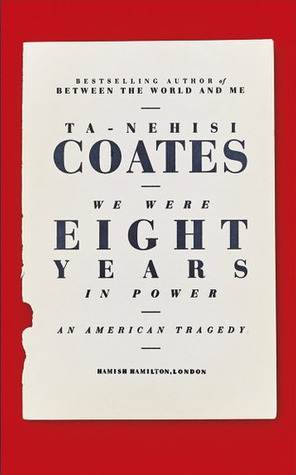 We Were Eight Years in Power: An American Tragedy by Ta-Nehisi Coates. This is a collection of essays by Ta-Nehisi Coates, published originally in The Atlantic magazine between 2008 and 2016 over the course of Barack Obama’s administration. In the book, Coates offers an additional reflection to introduce each piece. Time magazine listed the collection as one of its top ten non-fiction books of 2017. In a short review on GoodReads, Roxane Gay says of the book, “Thoughtful, sobering essay collection with moments of memoir. Some exceptional moments, some repetitive ideas, a glaring absence of reckoning with the intersection of race and gender. Well worth a read.”
We Were Eight Years in Power: An American Tragedy by Ta-Nehisi Coates. This is a collection of essays by Ta-Nehisi Coates, published originally in The Atlantic magazine between 2008 and 2016 over the course of Barack Obama’s administration. In the book, Coates offers an additional reflection to introduce each piece. Time magazine listed the collection as one of its top ten non-fiction books of 2017. In a short review on GoodReads, Roxane Gay says of the book, “Thoughtful, sobering essay collection with moments of memoir. Some exceptional moments, some repetitive ideas, a glaring absence of reckoning with the intersection of race and gender. Well worth a read.”
You Can’t Touch My Hair: And Other Things I Still Have to Explain by Phoebe Robinson. Disclaimer: I am a huge fan of the podcast (and now HBO show) 2 Dope Queens, so anything I have to say about Robinson’s book is biased. However, the book was a New York Times bestseller and Publishers Weekly says it is “Moving, poignant, witty, and funny…a promising debut by a talented, genuinely funny writer,” so it’s not just me. The book’s publisher describes the collection this way: “Being a black woman in America means contending with old prejudices and fresh absurdities every day. Comedian Phoebe Robinson has experienced her fair share over the years…Now, she’s ready to take these topics to the page—and she’s going to make you laugh as she’s doing it.”
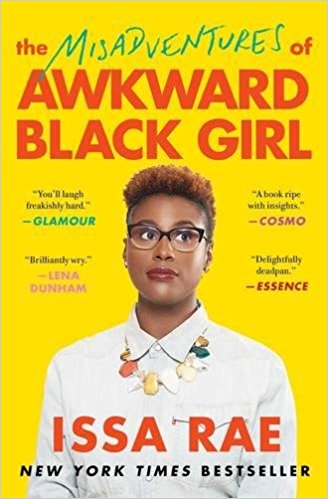 The Misadventures of Awkward Black Girl by Issa Rae. Another disclaimer: I am a big fan of Issa Rae’s web series of the same name and her HBO show Insecure, so again — I’m biased about this collection of essays because I loved her before I read it. But again, this was also a New York Times bestseller so I’m not alone. The book is humorous look at what it’s like for Rae to be unabashedly awkward in a world that regards introverts as hapless misfits and black as cool. “I’m awkward—and black. Someone once told me those were the two worst things anyone could be. That someone was right. Where do I start?”
The Misadventures of Awkward Black Girl by Issa Rae. Another disclaimer: I am a big fan of Issa Rae’s web series of the same name and her HBO show Insecure, so again — I’m biased about this collection of essays because I loved her before I read it. But again, this was also a New York Times bestseller so I’m not alone. The book is humorous look at what it’s like for Rae to be unabashedly awkward in a world that regards introverts as hapless misfits and black as cool. “I’m awkward—and black. Someone once told me those were the two worst things anyone could be. That someone was right. Where do I start?”
We Should All Be Feminists by Chimamanda Ngozi Adichie. A book length essay that aims to give a definition of feminism for the 21st century which. “With humor and levity, here Adichie offers readers a unique definition of feminism for the twenty-first century—one rooted in inclusion and awareness. She shines a light not only on blatant discrimination, but also the more insidious, institutional behaviors that marginalize women around the world, in order to help readers of all walks of life better understand the often masked realities of sexual politics. Throughout, she draws extensively on her own experiences—in the U.S., in her native Nigeria, and abroad—offering an artfully nuanced explanation of why the gender divide is harmful for women and men, alike.” For those of you TL;DR, consider checking out her TED Talk of the same name.
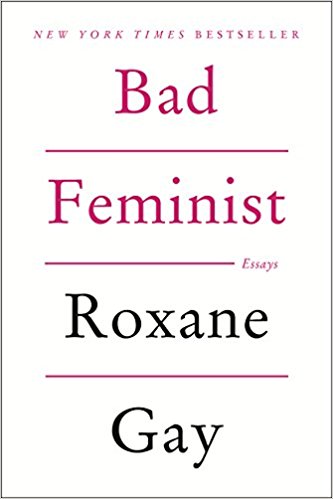 Bad Feminist by Roxane Gay. One more disclaimer: Roxane Gay is one of my favorite authors. I truly believe she is a national treasure. I’ve said before of this particular collection, “this book is brilliant in the way that it merges academic critique, pop culture commentary, and personal experience. The only ‘failure’ of the book is that I can’t sit down with Gay at my kitchen table after I read any of it to talk with her further. To say it is ‘thought provoking’ doesn’t even begin to cover it. The book was a New York Times best-seller, and a Time magazine reviewer called it ‘a manual on how to be human.'”
Bad Feminist by Roxane Gay. One more disclaimer: Roxane Gay is one of my favorite authors. I truly believe she is a national treasure. I’ve said before of this particular collection, “this book is brilliant in the way that it merges academic critique, pop culture commentary, and personal experience. The only ‘failure’ of the book is that I can’t sit down with Gay at my kitchen table after I read any of it to talk with her further. To say it is ‘thought provoking’ doesn’t even begin to cover it. The book was a New York Times best-seller, and a Time magazine reviewer called it ‘a manual on how to be human.'”
The Awkward Thoughts of W. Kamau Bell: Tales of a 6′ 4″, African American, Heterosexual, Cisgender, Left-Leaning,Asthmatic, Black and Proud Blerd, Mama’s Boy, Dad, and Stand-Up Comedian by W. Kamau Bell. The New York Times calls Bell “the most promising new talent in political comedy in many years,” and The New Yorker says of his writing style “Bell’s gimmick is intersectional progressivism: he treats racial, gay, and women’s issues as inseparable.” This collection is “a humorous, well-informed take on the world today, tackling a wide range of issues.” Roxane Gay describes it as “Part memoir. Part riffs on Bell’s interests. Part cultural criticism. The essays all have a meandering quality as if the writer is sitting next to you, telling you a good story. He is particularly good at showing his growth personally and professionally. Lots of warmth and heart and intelligence here.”
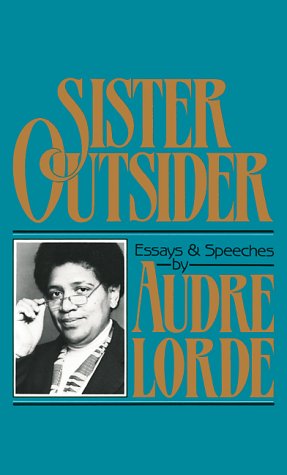 Sister Outsider: Essays and Speeches, Audre Lorde. Lorde’s poems and prose largely dealt with issues related to civil rights, feminism, and the exploration of black female identity, and this collection of 15 essays and speeches is no exception. The book is considered a classic volume of Lorde’s most influential works of non-fiction prose and has been groundbreaking and formative in the development of contemporary feminist theories. The collection is required reading in many cultural theory, literary criticism, gay/lesbian studies, and women’s studies programs at universities. The book examines a broad range of topics, including love, war, imperialism, police brutality, coalition building, violence against women, Black feminism, and movements towards equality.
Sister Outsider: Essays and Speeches, Audre Lorde. Lorde’s poems and prose largely dealt with issues related to civil rights, feminism, and the exploration of black female identity, and this collection of 15 essays and speeches is no exception. The book is considered a classic volume of Lorde’s most influential works of non-fiction prose and has been groundbreaking and formative in the development of contemporary feminist theories. The collection is required reading in many cultural theory, literary criticism, gay/lesbian studies, and women’s studies programs at universities. The book examines a broad range of topics, including love, war, imperialism, police brutality, coalition building, violence against women, Black feminism, and movements towards equality.
Black Ink: Literary Legends on the Peril, Power, and Pleasure of Reading and Writing edited by Stephanie Stokes Oliver. “Spanning over 250 years of history, Black Ink traces black literature in America from Frederick Douglass to Ta-Nehisi Coates in this masterful collection of twenty-five illustrious and moving essays on the power of the written word…Organized into three sections, the Peril, the Power, and Pleasure, and with an array of contributors both classic and contemporary, Black Ink presents the brilliant diversity of black thought in America while solidifying the importance of these writers within the greater context of the American literary tradition.”
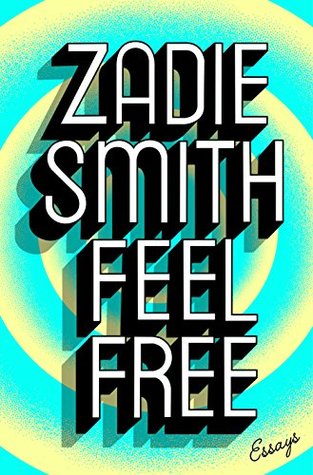 Feel Free by Zadie Smith. The latest publication from Smith brings together previously unpublished work and already classic essays in a contemplation of important recent events in culture and politics, as well as Smith’s own life, and is organized into five sections — In the World, In the Audience, In the Gallery, On the Bookshelf, and Feel Free. NPR says of the collection, “Brilliant…[Smith’s] new book is lively, intelligent and frequently hilarious, and proves that she’s one of the brightest minds in English literature today…Reading Feel Free is a lot like hanging out with a friend who’s just as at home in a museum as she is binge-watching a sitcom. She engages artists on their own terms; she’s opinionated, but not judgmental. And she manages to breathe new life into well-worn topics…There’s not an essay in Feel Free that’s less than engrossing. Sure, Smith is extremely intelligent, but smart authors are a dime a dozen: More importantly, she’s an elegant writer, original, big-hearted and enthusiastic.”
Feel Free by Zadie Smith. The latest publication from Smith brings together previously unpublished work and already classic essays in a contemplation of important recent events in culture and politics, as well as Smith’s own life, and is organized into five sections — In the World, In the Audience, In the Gallery, On the Bookshelf, and Feel Free. NPR says of the collection, “Brilliant…[Smith’s] new book is lively, intelligent and frequently hilarious, and proves that she’s one of the brightest minds in English literature today…Reading Feel Free is a lot like hanging out with a friend who’s just as at home in a museum as she is binge-watching a sitcom. She engages artists on their own terms; she’s opinionated, but not judgmental. And she manages to breathe new life into well-worn topics…There’s not an essay in Feel Free that’s less than engrossing. Sure, Smith is extremely intelligent, but smart authors are a dime a dozen: More importantly, she’s an elegant writer, original, big-hearted and enthusiastic.”
Love’s Long Line (21st Century Essays) by Sophfronia Scott. “Sophfronia Scott turns an unflinching eye on her life to deliver a poignant collection of essays ruminating on faith, motherhood, race, and the search for meaningful connection in an increasingly disconnected world.”